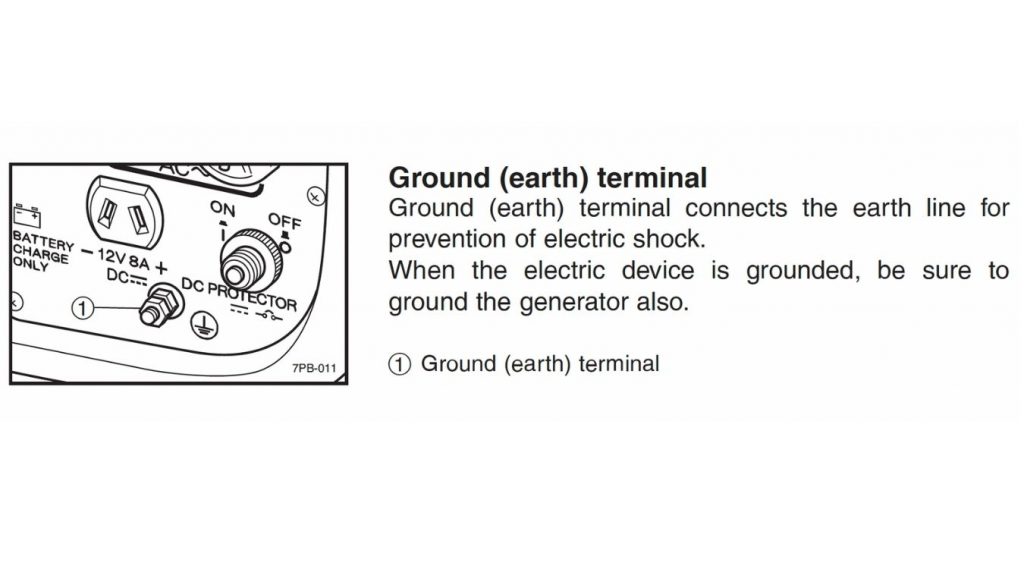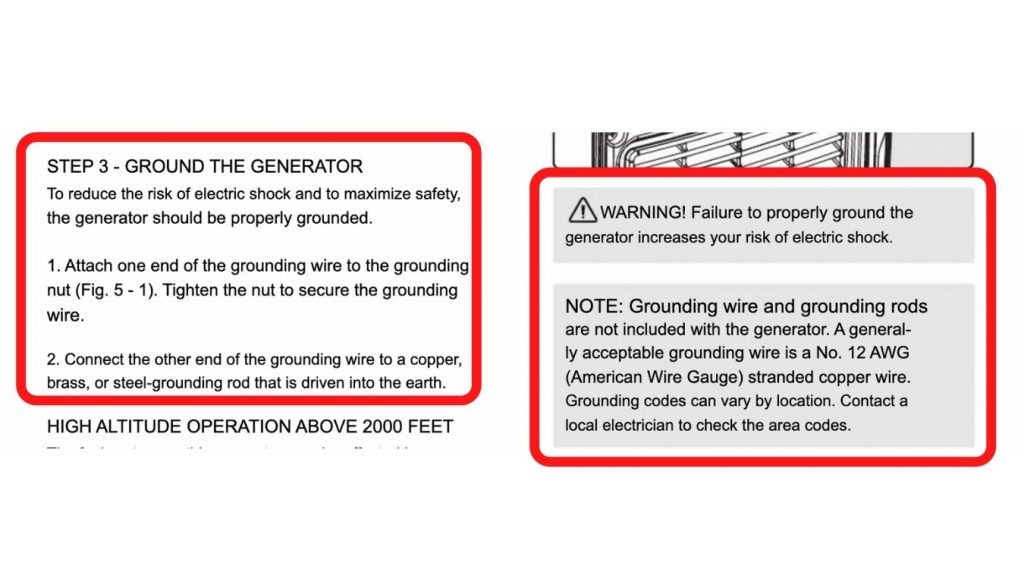Camping generators are a blessing in the wilderness. They power all your electronics, light up your campsite or RV and help you cook delicious meals if you are not carrying a propane or butane fuel stove.
But since it’s an electric powerhouse, you need to set it up to use it safely and properly. One of these safety aspects is properly grounding the generator.
But do I need to ground my generator when camping? You might ask. Since generators are portable, grounding them each time you set a camp might seem like a daunting task. But…
Yes, you need to ground your generator for improved safety and mitigate the risk of electrocution and damage to the connected appliances. Some generators are pre-grounded to the metal frame. Others need to be grounded with a buried ground rod. Always follow the manufacturer’s recommendation.
Let’s look at things in more detail to understand why grounding is necessary, which generators should be grounded, and the correct procedure for grounding your portable camping generator.
Why is grounding required?
Grounding any electrical equipment provide a path of least resistance to the short-circuited current to dissipate into the ground.
This alternate path prevents the fault current from passing through humans and electrocuting them or damaging any expensive equipment in its path.
If you look at most electric equipment in your home, you will see they have a 3-prong plug. The two prongs are the HOT & NEUTRAL terminals, while the third prong is the GROUND terminal.
This third terminal is attached to the body of the appliances and carries any short-circuited current. This GROUND terminal goes through your wall receptacle to connect to your main box where it is connected to your house ground line (a physical rod or wire buried 8 feet deep underground).
The below video explains the concept of ground in simple terms if you want to understand the concept further.
Do all generators need to be grounded?
Just like your house electric supply has a dedicated ground line that dissipates the faulty current to the ground, your electric generator should also be able to dissipate any faulty current to the ground safely.
Although all generators need to be grounded for safe operation, some generators can be grounded by connecting the GROUND terminal of the receptacles and other non-current-carrying parts (fuel tank, engine block etc.) to the frame of the generator.
Even if your generator is resting on rubber pads (usually used to quiet a generator), the frame will still act as ground.
Others need a dedicated ground rod connected to a terminal provided somewhere on the body. It varies from model to model and is also influenced by your local electrical safety code.
How do I know if my generator needs to be grounded?
So, how do you know if your generator needs a dedicated ground rod or not? To better understand this, you should first refer to your generator’s owner’s manual.
If it suggests a dedicated ground rod, that’s what you should do (I am discussing the grounding procedure below).
For example, if you own a YAMAHA EF2000iS (a pretty famous camping generator), the manual suggests connecting the generator’s earth terminal to the earth line (or grounding rod) IF your electrical appliance is grounded (i-e if your fridge or oven has a 3-prong plug instead of a 2-prong plug).
Simply put if you are running an appliance with a 3-prong plug, ground your generator with a grounding rod.

Another popular camping generator is WEN 56203i. I looked up the manual instructions, and it recommends grounding the generator with a 12 AWG wire but recommends following local grounding codes if they supersede this.

Suffice to say each manufacturer has different requirements based on how the generator is designed. To be completely safe, go over your owner’s manual and follow the manufacturer’s recommendation.
If the generator manual does not say anything or you don’t have the manual handy to look up the requirement, you should follow what your local code suggests.
The local code varies slightly from place to place, but all of them pretty much cover the basic safety needs of generator operation.
Does the law require generator grounding?
If you are living in the US, the governing body, in this case, is OSHA. I am a Mechanical engineer myself, but to correctly understand the grounding requirement for portable generators, I called my good friend Farooq who is an Electrical engineer and has vast experience in installing electrical systems for different applications.
He explained the OSHA requirement for portable generators to me, which I am going to reword for your easy understanding.
Under OSHA directs (29 CFR 1926.404(f)(3)(i), you DO NOT need to ground your generator via a dedicated ground rod if the following conditions are met:
- You are running electrical equipment directly through recapticals mounted on your generator (i-e you are not connecting your generator to your house main line).
- The non-current carrying metal parts (engine, fuel tank, etc) are connected to the generator frame, and also the GROUND terminal of the receptacle is connected to the frame as well (this is pretty much on every generator)
The first point indicates that you are running equipment directly from your generator, either directly plugging them in or through an extension cord. This is the case for most camping generators. If the same generator is connected to your home main circuit, this won’t be true.
The second condition says that all the non-current-carrying body parts should be electrically connected to the metal frame to act as ground (consider your generator’s metal frame as mini earth).
This is the case for almost all electric generators.
So to summarise, you don’t need a grounding rod if you are using your portable camping generator for camping to power small devices like lights or even a small space heater for tent.
Remember that your generator is still effectively grounded. You don’t need the extra buried rod to do it.
How to ground my generator?
Grounding your camping generator is not difficult or too technical. You don’t need an electrician or handyman to do it. All you need are a few items that can be found quite easily in any hardware shop or on Amazon.
Requirements
To ground your generator, you need the following tools and parts.
- 4 feet long copper or copper-coated steel rod [ Amazon link]
- NEC-compliant solid copper wire [Amazon link]
- Mallet or hammer
- Adjustable wrench
Procedure
- Identify an ideal location for the grounding rod: Look for a spot with soft soil that is neither excessively dry nor sandy, as these conditions lead to poor electrical conductivity. The perfect location would have slightly damp soil, which offers better grounding.
- Drive the grounding rod into the ground: Using a mallet or sledgehammer, firmly pound the grounding rod into the soil at your chosen spot. Ensure that at least 3 feet (approximately 91 cm) of the rod is buried in the ground for optimal grounding.
- Attach the copper wire to the grounding rod: Utilize a clamp to connect one end of the solid copper wire to the ground rod. Then, use a wrench to hand-tighten the nut, ensuring a secure connection.
- Connect the copper wire to the generator’s grounding terminal: Locate the grounding terminal on your camping generator, typically found on the back control panel and marked with a ground symbol. Attach the other end of the copper wire to this terminal.
- Inspect and secure all connections: Double-check all the connections between the grounding rod, copper wire, and generator. Make sure that both ends of the wire are tightly fastened to their respective points to ensure proper grounding and safety.
What happens if you don’t ground a generator?
Grounding your generator is a safety precaution. If you don’t ground your generator and there are no short circuits during its operation, then all is good. But if a short circuit happens on an ungrounded generator, it can:
- Result in electrocution if someone touches the short appliance
- Damage your expensive electric equipment.
- Can damage and burn out your wiring.
- Can result in fire inside your camp or trailer/RV
It is generally a good idea to ground your generator if you are going to use any heavy equipment like an electric kettle or heater.
How do you ground a generator on a trailer?
If you are camping out of your trailer or RV and using a portable generator for powering up your RV equipment, you will need to ground your generator.
The best way to ground your generator is to connect the ground terminal to the metal frame of your RV. You can also use a ground rod to do this if you want to be extra safe.
Do I Need to Ground My Generator When Camping – Conclusion
Camping generators are an essential part of our outdoor adventures. To safely operate them, we have to provide a proper grounding to mitigate any risk of short-circuiting.
To make sure your generator is safe, always follow the manufacturer’s recommendation for grounding.
If the manufacturer does not provide any instructions, consult your local electrical code and see if it can provide any guidance.
If you can’t do either, pound a 4 ft long rod into the ground and connect it to your generator’s ground terminal. You will be safe to operate your portable camping generator without any worry.
FAQs
Can I ground my generator to my car?
Yes, you can ground your generator to your car chassis, which can act as ground.
How deep does a grounding rod need to be for a portable generator?
NEC recommends the grounding rod be 8 feet deep. But for a portable generator used during camping, a few feet under the ground is enough to provide a good electrical connection.
Do I need to ground my generator for tailgating?
If you are tailgating, you can simply connect your generator’s ground terminal to your car chassis and it will be enough to provide good ground.
Recommended Camping Gears: I have compiled a list of my favourite camping gear in one place. The selection is based on my own personal experience using them for many years camping as well as feedback from fellow campers. Check them out on my Recommended Camping Gears page